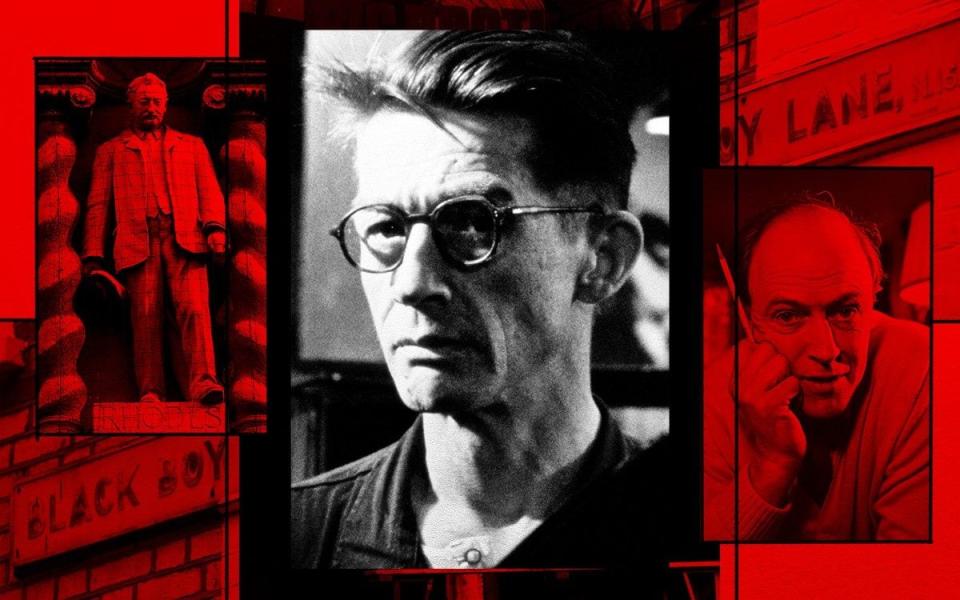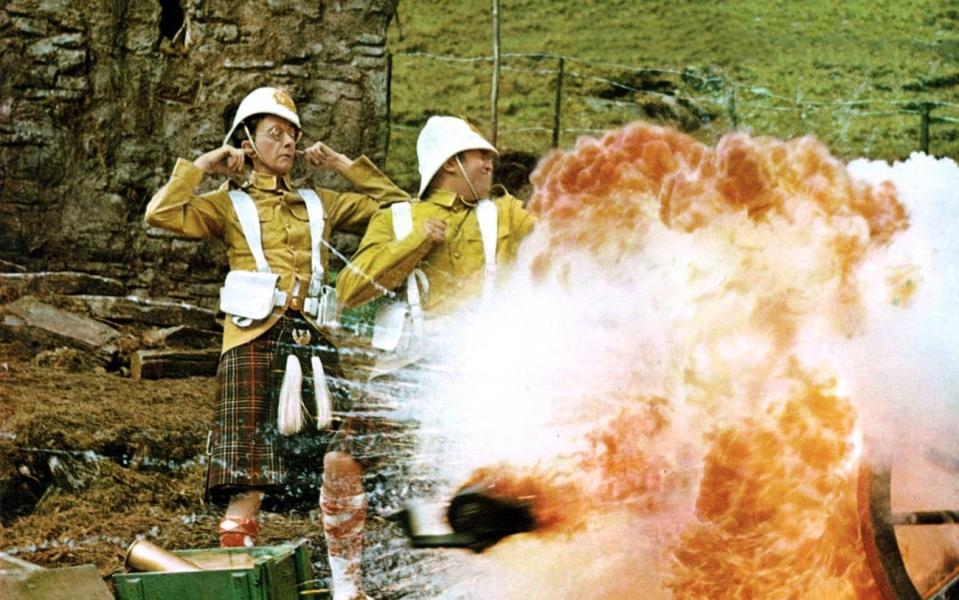What is it about the past that some young people find unbearable? After all, no one is expecting them to live through it. Indeed, some of us who did find the present infinitely worse. The vandalism of Roald Dahl’s writings for children by “sensitivity readers” to make them “suitable”, has brought the wickedness of rewriting, or eliminating, the past and evidence of it to the forefront of our discourse. It would also have Dahl (with whom I once spent an evening: shrinking violet he was not) turning in his grave. Sadly, it goes far beyond children’s books, and indeed books generally: films, statues, television programmes, indeed, if they are allowed into the public arena at all. Are we really so delicate? Why tolerate this lunacy?
George Orwell, to whom the Thought Police (a term he invented in Nineteen Eighty-Four) have yet to apply themselves, wrote in that very novel of a Britain in which “every record has been destroyed or falsified, every book rewritten, every picture has been repainted, every statue and street building has been renamed, every date has been altered. And the process is continuing day by day and minute by minute. History has stopped. Nothing exists except an endless present in which the Party is always right.”
We have arrived at our own endless present, or Year Zero, where the record, historical and otherwise, is readily falsified. Its rules are designed to prevent what that arrogant and self-regarding minority who feel obliged to police and alter the thoughts of the rest of us consider the ultimate crime: giving offence. Most of us have spent our lives encountering things that could, if we wallowed in self-regard, offend us deeply. We were trained to ignore them and get on with life. Now, suddenly, we cannot be trusted to do that.
Therefore books, art, films and television programmes must be censored or suppressed, statues taken down as though the lives they commemorate never happened, streets and buildings renamed to eradicate thought criminals. Like Pol Pot, that minority feels a moral duty to erase the past to attain Year Zero. Sadly for us, their main qualifications are an overbearing self-righteousness, a profound ignorance of history and a deep misunderstanding of the idea of liberty that few of us share.Simon Heffer
What is it about the past that some young people find unbearable? After all, no one is expecting them to live through it. Indeed, some of us who did find the present infinitely worse. The vandalism of Roald Dahl’s writings for children by “sensitivity readers” to make them “suitable”, has brought the wickedness of rewriting, or eliminating, the past and evidence of it to the forefront of our discourse. It would also have Dahl (with whom I once spent an evening: shrinking violet he was not) turning in his grave. Sadly, it goes far beyond children’s books, and indeed books generally: films, statues, television programmes, indeed, if they are allowed into the public arena at all. Are we really so delicate? Why tolerate this lunacy?
George Orwell, to whom the Thought Police (a term he invented in Nineteen Eighty-Four) have yet to apply themselves, wrote in that very novel of a Britain in which “every record has been destroyed or falsified, every book rewritten, every picture has been repainted, every statue and street building has been renamed, every date has been altered. And the process is continuing day by day and minute by minute. History has stopped. Nothing exists except an endless present in which the Party is always right.”
We have arrived at our own endless present, or Year Zero, where the record, historical and otherwise, is readily falsified. Its rules are designed to prevent what that arrogant and self-regarding minority who feel obliged to police and alter the thoughts of the rest of us consider the ultimate crime: giving offence. Most of us have spent our lives encountering things that could, if we wallowed in self-regard, offend us deeply. We were trained to ignore them and get on with life. Now, suddenly, we cannot be trusted to do that.
Therefore books, art, films and television programmes must be censored or suppressed, statues taken down as though the lives they commemorate never happened, streets and buildings renamed to eradicate thought criminals. Like Pol Pot, that minority feels a moral duty to erase the past to attain Year Zero. Sadly for us, their main qualifications are an overbearing self-righteousness, a profound ignorance of history and a deep misunderstanding of the idea of liberty that few of us share.
It is why the former slaver Sir Edward Colston’s statue was tipped into the water at Bristol, why extremists at Jesus College Cambridge (including the half-witted Bishop of Ely) wanted the Tobias Rustat memorial ripped out of the college chapel, and why others want to remove the effigy of Cecil Rhodes from Oriel College, Oxford, to punish his colonialism. Last year the London Borough of Haringey renamed Black Boy Lane “La Rose Lane” after John La Rose, “a champion of black history and equality”. None the less, the expensive new signs – the whole exercise, including compensating residents (none of whom wanted the name changed) cost £186,000 – all say “formerly Black Boy Lane”.
Cassland Road Gardens in Hackney, named after the slave trader John Cass, has gone, and is now Kit Crowley Gardens after a half-Barbadian “community hero” who experienced “poverty and racism”. A suggestion that Brent Borough Council would rename Gladstone Park after Diane Abbott, because of the Gladstone family’s links with slavery, has so far not been acted upon. Churchill’s statue in Parliament Square is considered a fair target for vandals because he favoured British rule in India: defeating Hitler is a minor consideration to historical ignoramuses. Elsewhere in the art world, Tate Britain is rehanging its paintings to put women at the centre of its display.
Self-appointed censors are not new. In 1807 Thomas Bowdler, a doctor, published the first edition of The Family Shakespeare, in which his sister Henrietta Maria had “edited” 20 of the Bard’s plays to remove immorality or indecency, a task that must have given this proto-snowflake the vapours. She removed around 10 per cent of the text, leaving something she thought women and children could read unsullied. Bowdler himself took on an even saltier task, sanitising Gibbon’s Decline and Fall of the Roman Empire.
At least you could still buy the unexpurgated Shakespeare and Gibbon if you wished: the late Georgians believed in choice. However, in the last century there were still suppressions: it was not until nearly 15 years after publication that James Joyce’s Ulysses, widely considered the greatest novel in our language, could be bought in Britain; not until after the war that Radclyffe Hall’s anodyne 1927 lesbian tale The Well of Loneliness was permitted. The Lady Chatterley trial in 1960 finally allowed men to contemplate allowing their wives and servants to read that book, and changed everything. We thought we had all grown up: how wrong we were.
Instead, a section of society with high responsibility for preserving freedom of speech and discourse – the trade of publishing – now willingly sacrifices its historic principles, for which people once risked prison, to censor books. I know a novelist and a social scientist, both of great standing, who cannot find publishers prepared to put out such books as they want to write, because of fear those works might offend the self-righteous clique. Even 10 years ago they would have been published without demur.
The most scandalous recent case is of Prof Nigel Biggar, the Oxford academic whose book Colonialism: A Moral Reckoning was accepted by Bloomsbury, which then – shame be upon them – decided not to publish. William Collins did; it is now a bestseller (and one imagines uncensored Dahl editions are, similarly, selling like hot cakes, too). People like an argument and in a free society deserve to be allowed one: they don’t want some affronted youth telling them they can’t read, learn and dispute something, like the Victorians covering up their table legs.
Prof Biggar’s book committed the crime of stating a simple truth: that the British Empire did good things as well as bad. The hostility with which such a contention is met today is deranged: it is literally undebatable. Indeed, a prime motivation in wiping out the past and creating the endless present is the determination of a young generation of British people – ironically almost all white, and expensively educated – to make their fellow Britons hate themselves for their heritage.
Doubtless there is much outrage to come. In the past, our people wrote books that mocked minorities (think of Dickens’s treatment of Fagin in Oliver Twist, or Trollope’s of Melmotte in The Way We Live Now, or almost anything by Carlyle. Before long a “sensitivity reader” – someone of a mindset incomprehensible to most of us – will decree it best we do not read these works at all. The climate has changed violently, precisely because we have allowed it to.
Repeat channels on television warn viewers they may encounter “language and attitudes” they find offensive: but at least, for now, these programmes are still shown. There are no repeats of It Ain’t Half Hot Mum, because an actor blacked up in it (the fact that the satire’s main target was the British Army, and its officer class, seems not to have registered). Nor can Till Death Us Do Part be shown, even though Johnny Speight, its writer, was a Leftist who wished to highlight racism through his brilliant creation, Alf Garnett. By far the best Carry On film, Up the Khyber, can’t appear because Kenneth Williams and Bernard Bresslaw black up as the Khasi of Kalabar and his henchman Bungdit Din, in mocking the hated Raj. And Guy Gibson’s faithful labrador in The Dam Busters has his name bleeped out.
The notion that if you don’t like it, you don’t have to watch it is beyond our censors. Their pompous self-righteousness about “safe spaces” at their universities was never questioned: their dons lived in fear of them, in case the Stalinist Twitter mob attacked them and destroyed their careers (which very nearly happened to Prof Biggar, and has happened to others, usually for criticising the lunacy of identity politics). They inflict their control freakery on their elders, who are equally terrified to gainsay them.
It does not bear saying often enough that these are a small, unrepresentative minority whose undue influence is wrecking free expression. They seek to distort and even eliminate our past, a past they deem too unsafe for us to encounter, and in doing so squash the vital impulse of intellectual curiosity. It starts with censoring a few children’s books. If we don’t make a stand, it will end with destroying our democratic right to liberty, and sooner than we imagine.






No comments:
Post a Comment